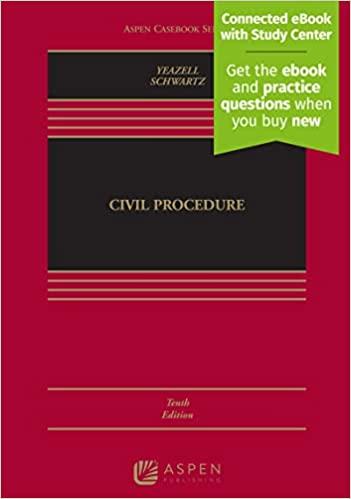Need help with legal aspects of law
9. Are the burglar tools and stolen property discovered by Office Hassle admissible at Miscreant's trial? A. No, because Miscreant did not consent to the search of his locker B. Yes, because the burglar tools and stolen property were in plain view once Hassle opened the locker C. No, unless Hassle was in hot pursuit of Miscreant D. Yes, because the locker was on business. premises owned by Spike which allowed him to consent to the search 10. Are the marijuana plants, burglar tools, and stolen property admissible at Spike and Miscreant's trials if Spike failed to respond to Hassle's request to search the business premises and locker? A. No, because Spike's silence does not constitute consent to search the business premises or the locker B. Yes, because Spike's silence must be interpreted as consent for searches of the business premises and locker C. Yes as to the business premises but no as to the contents of the locker D. No as to the business premises but yes as to the contents of the locker 11. If Spike was charged with possession of the marijuana plants and Spike's Motorcycle Repair Shop was charged with laundering proceeds from the sale of marijuana, which of the following statements correctly summarizes the coverage of the Fifth Amendment's right to be free from self-incriminatin A. Spike could invoke the right to be free from self-incriminating on his behalf and on behalf of the motorcycle repair shop B. Spike could invoke the right to be free from self-incriminating on his behalf but not on behalf of the motorcycle repair shop C. Spike could invoke the right to be free from self-incriminating on behalf of the motorcycle repair shop but not on his own behalf D. Spike could not invoke the right to be free from self-incriminatingon his behalf or on behalf of the motorcycle repair shop 12. Would the Fifth Amendment's right to be free from self-incriminatingapply if Officer Hassle questioned Spike at his business premises prior to his arrest? A. No, because the right to be free from self-incriminating is only applicable when an individual is subject to custodial interrogation B. Yes, because the right to be free from self-incriminating is applicable to any question asked by a police officer C. No, because the right to be free from self-incriminatingis only applicable after a criminal suspect has been arrested, booked, and arraigned D. Yes, because the right to be free from self-incriminating is applicable to any question asked by a police officer or private citizen







